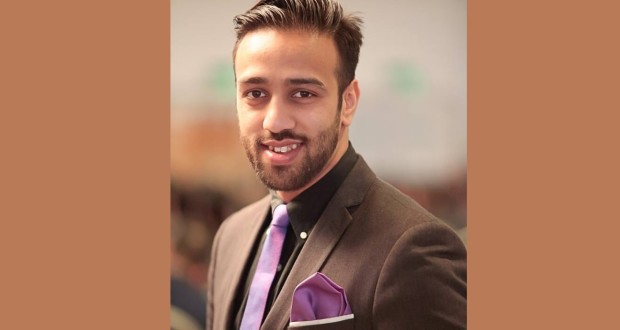Abu Talha Chowdhury could be the youngest member of Tower Hamlets Council if he is elected on 11th June – and what a breath of fresh air he would be on a body that so often seems to be far away from the streets, from the reality of life for most people in the borough. Abu Talha spared a few minutes from his busy schedule to talk about the contribution he could make on the Council.
Q: Talha, at Rabina Khan’s recent Manifesto Launch, Lutfur Rahman called you forward and described you as “the next generation” and worthy of stepping up to a new challenge. What would “the next generation” bring to the Council?
ATC: For one, if elected, I would be the youngest councillor in Tower Hamlets. I can represent young people. The Council spends up to £10 million on youth services, and it needs every pound to pay for a service young people want – not just what routine managers think would be a good thing. I can be the go-between, listening to young people themselves, talking to the youth workers (we have some top-notch workers in the borough), bringing into the Town Hall the information about what young people want. We need to make sure there are ways that young people across the whole borough can be involved in running their local youth services, so the spending on them is as effective as possible.
Stepney Green has a good provision, with Haileybury and Dame Colet House having been beacons of good practice for years. We also have excellent open spaces in the ward – and we can use those spaces better for organised activities as well as informal chillaxing.
Q: What is the biggest problem facing the people of Stepney Green and how can you tackle this?
ATC: Unfortunately, there’s lots of problems.
Anti-social behaviour (ASB) is a problem across Tower Hamlets, and it happens in Stepney Green too, particularly in certain hotspots. We have to pay attention to how to keep young people busy, interested and active so trouble can be avoided. Young people are not naturally troublesome, but we need to show the Council cares and offers hope for a better future.
One of Cllr Rabina Khan’s manifesto pledges is to bring Career Development workers into the youth services: that would be a brilliant move, to really bring a multi-agency approach to young people. The young people of today are tomorrow’s parents, so we need to get everyone caring about the wider community, not fighting each other.
Again, councillors can be go-betweens: immediately there on the ground, and liaising with statutory services and other agencies to find solutions when problems flare up. It’s not a case of going in with a big stick or a carrot, but knowing which tool to use, and when.
There are other problems in Stepney too. Leaseholder charges are a big concern, and we need to get to the bottom of what’s been going on in Tower Hamlets Homes about their charges and methods of working – and put it right. It’s not just an issue for leaseholders, because whatever leaseholders are charged is also being charged to tenants – even if it’s not itemised in their rent, so it’s not so obvious. Getting leaseholder charges right would benefit tenants too: there’s no need to pit residents against each other, as if they didn’t have this common issue.
But it’s not just about spotting what today’s problems are: it’s being there to find out tomorrow’s problems too. I pledge to do mobile surgeries – getting out on to the estates to meet the people, immediately available. I would not be the sort of councillor who sits in a room hoping people will come and queue up to see me.
Q: There is something of an antagonism between Mayor Lutfur Rahman’s policy of building more homes, and Labour’s recent misgivings that this is leading to over-density. How can the Council find a positive way forward?
ATC: It is a Catch 22 situation. The whole of London has a density problem. We need new homes, but we need the local infrastructure to support them – which means we need our green spaces too. The Borough has received an award for how we have dealt with density on the Ocean Estate, so we do have expertise to draw on.
I’m afraid that Labour, which has had a majority on the planning committees in the last few years, has not really been tough enough on making sure developers put in that infrastructure when they build. We have to make it clear to developers that we cannot subsidise their developments from our reduced council funds, and they will need to take care of the infrastructure and providing social homes.
We need to be imaginative, and to see how many private sector homes we can bring back into use. But at the end of the day,when you have 20,000 on the waiting list, the priority has to be putting rooves over their heads. If you are homeless, or overcrowded, it’s no comfort to be asked to continue in that situation so that you don’t contribute to a density problem.
Q: Is education the way out of Tower Hamlets, or a way to come back in?
ATC: I went to school here and to Tower Hamlets College – but, like many people of my age, I went to university elsewhere in London. It’s good if Tower Hamlets graduates are working across London – and even across the world – because it’s all part of creating a positive image of our borough, of bringing business and investment back here.
On the other hand, we need local opportunities for graduates too. We need to talk to businesses such as those at Canary Wharf to make sure local people have access to the whole range of jobs. I am entirely confident that our graduates could, do and will get work there of their own accord, but I think we can also intervene to get these businesses used to the idea that local people can come and work in Canary Wharf – not just shop there and drink coffee. The Whitechapel vision offers us a big opportunity to bring that approach in too.
Q: There’s five more years of “austerity” coming from the national Government: what should the Council’s response be?
ATC: Cllr Rabina Khan is pledging not to cut front line services. I am not sure what John Biggs’s approach would be. We have to chase up all the money we are due and use our money wisely – but at the same time we can’t invent money, and we need to campaign to reverse the axe, given the scale of what is in the pipeline. We will have to take a lead and work with other councils to show that these austerity policies are not only inhumane but also counterproductive because they make the economy shrink, not grow.
Q: What can we do to get more women on the Council?
ATC: Cllr Kahn – Rabina – is already a massive beacon showing what women can do in this borough. Mayor Lutfur Rahman made a good start in getting more women involved in public life. During his Administration, there has been a sea change at the Town Hall, with the workforce really reflecting the make up of the community after years of paper polices under Labour failed to deliver the to the full. You can feel it when you go into the Town Hall – you are really being valued for the first time in years.
Many of these new workers, from different ethnic backgrounds, are women. We now need to take this further forward. A Mayor Rabina Khan Administration could build on what has been done with her focus on women’s employment by encouraging women to come forward in TRAs and as Community Champions and so on. Perhaps we can also help by getting more men to do the washing up!
Other candidates standing in the Stepney Green by-election are:
Sabina Akhtar (Labour), Safiul Azam (Conservative), Kirsty Chestnutt (Green), Will Dyer (Liberal Democrats), Afsar Khan (Independent), Jessie MacNeil-Brown (Something New), Pau Shea (UKIP).
[Adverts]
 East London News A Force for the community…
East London News A Force for the community…




